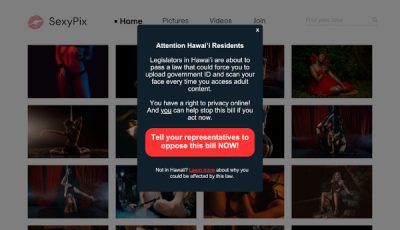Indiana Court Blocks State’s Age Verification Law
 INDIANAPOLIS, Ind. – In an order filed Friday, a District Court in Indiana granted a motion for preliminary injunction of Indiana’s SB 17 filed by the Free Speech Coalition and their co-plaintiffs, finding that the law is “likely facially unconstitutional under the First Amendment.”
INDIANAPOLIS, Ind. – In an order filed Friday, a District Court in Indiana granted a motion for preliminary injunction of Indiana’s SB 17 filed by the Free Speech Coalition and their co-plaintiffs, finding that the law is “likely facially unconstitutional under the First Amendment.”
In the order, Judge Richard L. Young noted that in “four opinions between 1989 and 2004, the Supreme Court laid out the First Amendment standards applicable to regulating pornographic and pornographic-adjacent material transmitted through wires into private homes (i.e., through the internet, telephone lines, and television lines).”
“In the case most like the one here, the Supreme Court affirmed the preliminary enjoinment of the Child Online Protection Act,” Young observed. “That statute imposed penalties on websites that posted content that was ‘harmful to minors’ for ‘commercial purposes’ unless those websites ‘required the use of a credit card or ‘any other reasonable measures that are feasible under available technology’ to restrict the prohibited materials to adults.”
“The Supreme Court noted that such a scheme failed to clear the applicable strict scrutiny bar,” Young added. “That was because the regulations were not particularly effective as it was easy for minors to get around the requirements and failed to consider less restrictive alternatives that would have been equally effective such as filtering and blocking software. All of that is equally true here, which is sufficient to resolve this case against the Attorney General.”
In a statement published Friday, FSC said the organization “fully agrees with the decision of the District Court in Indiana preventing that state’s age verification law from taking effect on Monday, July 1.”
“As FSC has repeatedly asserted, we can and should work to prevent minors’ from accessing age-inappropriate material and there are less burdensome solutions that do not violate the rights of legal adults to access the internet without enduring surveillance or risking their anonymity,” FSC added.
In his decision, Young delved into the practical limitations of age-verification technology and the historical background of efforts to curb minors’ access to age-restricted materials online, citing torrents, VPNs and other workarounds commonly employed by users to defeat blocking and filtering technologies that attempt to fix the user’s location.
“With this background, it is easy to see why age verification requirements are ineffective at preventing minors from viewing obscene content,” Young wrote. “The Attorney General submits no evidence suggesting that age verification is effective at preventing minors from accessing obscene content; one source submitted by the Attorney General suggests there must be an ‘investigation’ into the effectiveness of preventive methods, ‘such as age verification tools.’”
You can read Judge Young’s full order granting the injunction here, and his order enjoining enforcement of the statute here.












